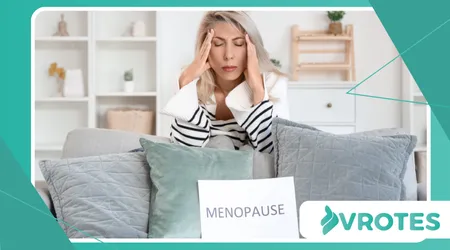Menopause-Triggered Migraines: Understanding the Hormonal Link

The onset of Menopause-Triggered Migraines often catches women by surprise, adding another layer of complexity to an already challenging life transition.
Anúncios
It’s a common yet frequently misunderstood phenomenon, linking hormonal fluctuations to debilitating head pain.
This intricate dance between hormones and neurology demands a closer look.
This isn’t just about a simple headache; it’s a direct consequence of the body’s profound hormonal shifts.
The rapid decline in estrogen and progesterone during perimenopause and menopause can destabilize the neurological system, making it more susceptible to migraine attacks.
Anúncios
For many, this hormonal shift turns a pre-existing predisposition for migraines into a recurring and intense reality.
The Estrogen Connection: A Neurological Rollercoaster
Estrogen is more than a reproductive hormone; it plays a critical role in brain function.
It influences serotonin, a key neurotransmitter involved in mood regulation and pain perception. As estrogen levels plummet, this delicate balance is disrupted.
This disruption can lead to an increase in migraine frequency and severity. Think of it like a finely tuned orchestra suddenly losing its conductor.
The instruments—in this case, your neurotransmitters—begin playing out of sync, creating a cacophony of pain.
For some women, the link is so clear they can track their migraines alongside their irregular cycles.
This pattern often intensifies as they transition through perimenopause, with migraine attacks becoming more frequent and unpredictable. It’s a clear signal that the hormonal shifts are the primary driver.

Progesterone’s Role and the “Menopausal Migraine”
While estrogen often gets the spotlight, progesterone also plays a significant role.
Its calming, inhibitory effects on the central nervous system provide a buffer against neurological excitability. As progesterone production wanes, that protective effect diminishes.
Read more: Sensory Changes (Taste, Smell) During Menopause
This hormonal duet, or lack thereof, can leave the brain more vulnerable to triggers.
Research from a 2021 study published in the journal Headache found that migraine prevalence significantly increases in women during the menopausal transition, directly correlating with fluctuations in both estrogen and progesterone.
The data underscores the powerful link.
This biological reality explains why some women who never experienced migraines before suddenly find themselves grappling with them.
Their brain, previously shielded by stable hormone levels, is now navigating a new, more volatile landscape.
The Anatomy of a Menopause-Triggered Migraine Attack
A typical Menopause-Triggered Migraine isn’t your average headache. It often presents with pulsating pain, usually on one side of the head, and can be accompanied by auras.
Symptoms might include sensitivity to light, sound, or smell, and in some cases, nausea and vomiting.
See how interesting: The Link Between Gut Inflammation and Anxiety
The experience is profoundly different from a tension headache. It can be so incapacitating that it disrupts daily life, making work, social events, and even simple tasks impossible.
One woman I interviewed, a 55-year-old retired teacher, described her attacks as feeling like her brain was “on fire and about to burst.”
Another woman, a professional photographer, found that the visual auras preceding her migraines made it impossible to see through her camera’s viewfinder.
It was a direct and undeniable impact on her career and passion, highlighting the severe consequences of this condition.
The Role of Stress and Lifestyle in Worsening Symptoms
While hormones are the root cause, other factors can exacerbate the problem. Stress, sleep disruption, and dietary triggers can all act as catalysts.
The menopausal period is often a time of significant life changes, and the cumulative stress can lower the migraine threshold.
Check this out: How Eating Seasonally Can Improve Hormonal Balance
For example, inconsistent sleep patterns, a common menopause symptom, can make the brain more susceptible to an attack.
The absence of a regular sleep-wake cycle removes a crucial pillar of neurological stability.
A simple trigger like a glass of wine or a strong cup of coffee can then unleash a full-blown migraine.
Consider the brain like a pressure cooker.
Hormonal changes turn up the heat, and external stressors like poor sleep or stress act as a release valve, but instead of releasing pressure, they cause an explosion.
Managing these external factors is a vital part of finding relief.

Managing the Migraines: A Multi-Pronged Approach
Effectively managing Menopause-Triggered Migraines requires a comprehensive strategy. The first step is to accurately diagnose the type of migraine and its potential triggers.
This often involves keeping a detailed diary of attacks, noting food, sleep, and stress levels.
Hormone replacement therapy (HRT) can be a highly effective treatment for some women, as it helps stabilize the hormonal environment.
For others, preventative medications or acute treatments may be necessary. It’s not a one-size-fits-all solution.
| Management Strategy | Description |
| Hormone Therapy | Stabilizes estrogen and progesterone levels. |
| Lifestyle Modifications | Focus on stress reduction, sleep hygiene, and diet. |
| Pharmacological Treatments | Preventative drugs (e.g., CGRP inhibitors) or acute pain relievers. |
| Complementary Therapies | Acupuncture, biofeedback, or yoga. |
This table illustrates the diverse options available, each tailored to the individual’s needs. This combination of medical and lifestyle approaches is crucial.
A Call for Acknowledgment and Open Dialogue
It’s time to normalize the conversation around Menopause-Triggered Migraines. Too many women suffer in silence, dismissing their pain as an unavoidable part of aging.
This condition is not just a nuisance; it’s a legitimate medical issue that deserves attention and effective treatment.
Recognizing the hormonal link is the first step toward finding relief. Why should women endure debilitating pain when effective treatments and management strategies are available?
By seeking professional guidance and adopting a holistic approach, women can regain control over their health and their lives, freeing themselves from the shadow of these painful attacks.
Frequently Asked Questions
Do all women get migraines during menopause?
No, not all women will experience migraines during menopause.
The susceptibility is often linked to a pre-existing history of migraines, particularly those associated with menstrual cycles. However, some women may develop them for the first time.
Can diet trigger these migraines?
Yes, certain foods and beverages like red wine, aged cheeses, and processed meats can be triggers for some individuals. Keeping a food diary can help identify specific culprits.
Is HRT a cure for menopause-triggered migraines?
While HRT can be highly effective by stabilizing hormone levels, it’s not a guaranteed cure.
Its success depends on the individual’s specific hormonal needs and migraine profile. It’s often used as part of a broader treatment plan.
++ Headaches and menopause: what’s the link?
++ How Hormonal Changes in Women Trigger Migraine
